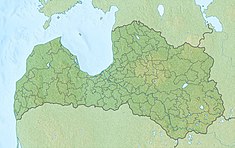Riga Hydroelectric Power Plant
Hydroelectric power plant in Latvia From Wikipedia, the free encyclopedia
Riga Hydroelectric Power Plant (Latvian: Rīgas hidroelektrostacija, shortened Rīgas HES) is located just beyond Riga's southern border. It is geographically located in the town of Salaspils. Total installed power generating capacity is 402 MW.[1] There are six generators, two transformers and two 330 kV power lines (to Salaspils and Bišuciems).
This article needs additional citations for verification. (March 2008) |
| Riga Hydroelectric Power Plant | |
|---|---|
 Riga Hydroelectric Power Plant | |
| Country | Latvia |
| Location | Salaspils |
| Coordinates | 56°51′8″N 24°16′19″E |
| Status | Operational |
| Power Station | |
| Operator(s) | Latvenergo |
| Commission date | 1974 |
| Type | Conventional |
| Turbines | 6 |
| Installed capacity | 402 MW |
| Capacity factor | 16% (2018) |
| 2018 generation | 564 GW·h |
History
The Riga Hydroelectric Power Plant was put into operation in 1974.[1] In order to build Riga HES, a dam was constructed across the Daugava River through the middle of Doles Sala, half of which has since been flooded to make room for Riga Reservoir. Along with Doles Sala, there have been several other smaller islands drowned in order to fill the reservoir. The dam was built in the late 1970s. Aside from its main purpose of keeping the reservoir contained, its top is used as a motor vehicle highway. A railroad was also constructed on the dam, but it was utilized only during construction of the powerplant and was demolished at the beginning of the 21st century. This is because there are no existing railroads on the Daugava's left bank. This railroad began at Salaspils railway station, and ended at approximately the middle of Doles sala.
Description
There is a powerline pylon in the middle of reservoir, it carries two 330 kV lines (from Salaspils to Jelgava and from Salaspils to Rīgas HES), shore to shore distance there is approximately 1 kilometre (0.62 mi).
Rigas HES is an important part of Riga's development. It is the primary source of electricity in Riga, while Riga reservoir is a source of tap water for the majority of Riga residents. In addition, the power plant is used as a compensation plant for TEC2 thermal power plant to regulate voltage in electrical networks and to compensate the power deficiencies.[1]
The power plant is operated by Latvenergo.
See also
References
External links
Wikiwand in your browser!
Seamless Wikipedia browsing. On steroids.
Every time you click a link to Wikipedia, Wiktionary or Wikiquote in your browser's search results, it will show the modern Wikiwand interface.
Wikiwand extension is a five stars, simple, with minimum permission required to keep your browsing private, safe and transparent.

